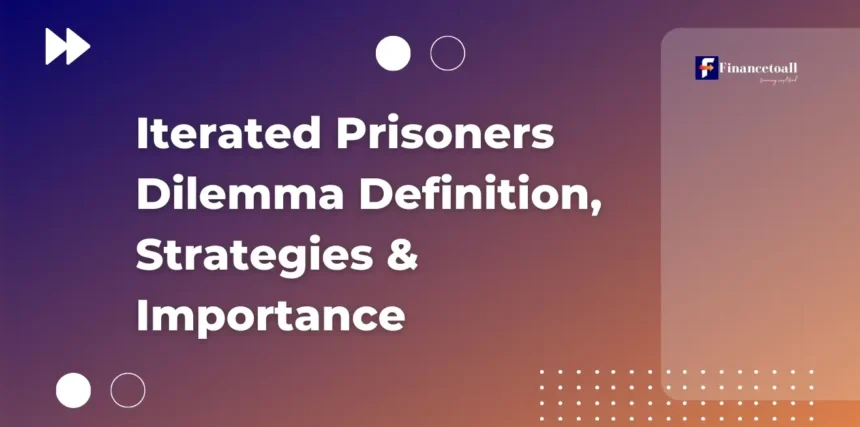The Iterated Prisoner’s Dilemma: A Powerful Game Theory Concept in Finance
The Iterated Prisoners Dilemma (IPD) is a game theory concept where participants repeatedly decide to cooperate or defect, influencing trust and reputation over time. In finance, it mirrors real-world scenarios like trading, lending, and corporate partnerships.
Decision-making isn’t a one-time affair, every transaction, investment, or partnership builds on the previous one, creating a web of trust, cooperation, and sometimes competition.Iterated Prisoner’s Dilemma (IPD) is a concept from game theory on how trust and strategies evolve over repeated interactions. When applied to finance, it helps us understand key dynamics in trading, lending, partnerships, and even regulatory compliance.
In this article, we’ll explore the Iterated Prisoner’s Dilemma in detail, break down its key concepts, and uncover its relevance in finance.
Key Takeaways from the Iterated Prisoner’s Dilemma
- Trust and Reputation Matter: Strong relationships in finance are built on consistent fairness and reliability, unlocking better opportunities and partnerships.
- Focus on the Long Term: Prioritizing sustainable gains over short-term profits fosters cooperation and mutual success.
- Adaptability Ensures Fairness: Responsive strategies like tit-for-tat promote fairness and discourage selfish actions.
- Defection Has Costs: Opportunistic behavior may yield short-term gains but erodes trust and long-term relationships.
- Finance Reflects IPD Principles: From trading to corporate partnerships, applying IPD insights leads to more cooperative and rewarding outcomes.
What is the Iterated Prisoner’s Dilemma?
Let’s start with the basics. The Prisoner’s Dilemma is a thought experiment in game theory. Imagine two prisoners are arrested for a crime. They’re interrogated separately and given two choices:
- Cooperate (stay silent).
- Defect (betray the other).
If both cooperate, they get a light sentence. If one defects while the other cooperates, the defector goes free while the cooperator gets a harsh sentence. If both defect, they both get moderate sentences. The twist is that each prisoner’s decision affects both of them, and they can’t communicate.
In the Iterated Prisoner’s Dilemma, this scenario is repeated multiple times. Players (or participants) remember past actions and adjust their strategies accordingly. This transforms a one-time decision into a dynamic game where reputation, trust, and long-term thinking come into play.
Why the Iterated Prisoner’s Dilemma Matters in Finance
In finance, relationships are often built on repeated interactions. Whether you’re trading stocks, negotiating contracts, or managing credit, trust is a key ingredient. The Iterated Prisoner’s Dilemma mirrors these situations and helps explain how cooperation or competition unfolds over time.
- Trust and Reputation: Financial decisions often depend on whether you trust your counterpart. In an iterated setting, maintaining a good reputation can lead to long-term benefits.
- Strategic Thinking: Repeated interactions encourage participants to think beyond short-term gains and focus on sustainable strategies.
- Real-World Scenarios: Many financial relationships—like partnerships, market trades, or regulatory compliance—follow patterns similar to the IPD.
Key Concepts of the Iterated Prisoner’s Dilemma in Finance
1. Cooperation vs. Defection
In the context of finance, cooperation means working together for mutual benefit. This could be fair pricing in trades, honoring contracts, or complying with regulations. Defection, on the other hand, means acting selfishly at the expense of others—like exploiting market inefficiencies, breaking contracts, or withholding critical information.
Example:
Imagine two banks trading derivatives. If both share accurate information, they can manage risks better (cooperate). But if one withholds data to gain an advantage, it risks breaking trust (defect).
2. Tit-for-Tat Strategy
The tit-for-tat strategy is one of the simplest and most effective in the Iterated Prisoner’s Dilemma. Here’s how it works:
- Start by cooperating.
- In subsequent rounds, mimic your opponent’s last move.
In finance, this means rewarding cooperation with cooperation and punishing defection with defection.
Example:
A trader offering favorable terms in a deal expects the same in return. If the other party undercuts them, the trader retaliates by offering less favorable terms in future trades.
3. The Shadow of the Future
The “shadow of the future” refers to the idea that the possibility of future interactions influences current decisions. If parties expect to interact again, they’re more likely to cooperate.
Example:
A venture capital firm and a startup may avoid short-term opportunism because they aim to build a long-term partnership. The promise of future funding encourages mutual cooperation.
4. Reputation and Reciprocity
In finance, reputation is currency. Repeated interactions allow parties to build trust and establish reciprocity, leading to better outcomes over time.
Example:
A borrower with a strong track record of timely repayments earns trust and gets better loan terms from banks.
Applications of Iterated Prisoner’s Dilemma in Finance
Now that we understand the theory, let’s explore how it applies to real-world finance.
1. Trading Relationships
Traders and market participants interact repeatedly in financial markets. Cooperation, such as sharing market insights or offering fair prices, can create long-term mutual gains.
Example:
In the foreign exchange market, traders who consistently provide liquidity are rewarded with better terms. Those who act opportunistically risk losing counterparties.
2. Corporate Partnerships
When companies collaborate—like in joint ventures or supply chain agreements—they face a dilemma: cooperate for mutual growth or defect for immediate gains.
Example:
Two tech firms working on a joint project must share resources and insights. If one withholds information, it may gain in the short term but risk the partnership’s future.
3. Lending and Borrowing
Banks and borrowers engage in a repeated game of trust. Borrowers need favorable terms, and banks need assurance of repayment.
Example:
A business that consistently repays loans on time builds a strong reputation. This leads to easier access to credit and better interest rates.
4. Regulatory Compliance
Financial institutions interact repeatedly with regulators. Cooperating with audits and adhering to guidelines ensures smoother operations and reduced scrutiny.
Example:
A bank that openly discloses its practices during audits builds goodwill with regulators, reducing the likelihood of harsh penalties.
Strategies in the Iterated Prisoner’s Dilemma for Finance
Understanding and applying the right strategies can make all the difference.
1. Start with Cooperation
Initiating interactions with cooperation sets a positive tone. In finance, this might mean offering fair terms or being transparent in negotiations.
2. Build a Reputation for Fairness
A strong reputation for fairness can attract better opportunities and discourage others from defecting.
Example:
A mutual fund manager known for transparency attracts more investors than one with opaque practices.
3. Punish Defection Strategically
While cooperation is ideal, it’s important to respond to defection to discourage future selfish behavior.
Example:
If a supplier delivers late, a company may renegotiate terms or switch vendors to signal that defection has consequences.
4. Focus on Long-Term Gains
Short-term profits are tempting, but the Iterated Prisoner’s Dilemma teaches us that sustainable strategies pay off in the long run.
Why Trust Matters in Finance
Trust and reputation are essential in finance. The Iterated Prisoner’s Dilemma shows that cooperation over repeated interactions builds long-term success, while defection often leads to lost opportunities and damaged relationships.
Real-World Examples
Here are some real-world applications that bring the Iterated Prisoner’s Dilemma to life in finance:
- OPEC Production Agreements: Oil-producing countries face a dilemma—limit production to maintain prices (cooperate) or overproduce for individual gains (defect). Repeated negotiations ensure balance.
- Banking Syndicates: In syndicated loans, banks must cooperate to manage risk. One bank’s defection by overexposing itself can harm the entire syndicate.
- Stock Market Behavior: Traders who consistently undercut others lose trust and find it harder to build meaningful relationships.
Challenges in Applying the Iterated Prisoner’s Dilemma
Despite its usefulness, the Iterated Prisoner’s Dilemma isn’t without challenges:
- Uncertainty: Incomplete information can lead to misinterpreted actions.
- Short-Term Pressures: Financial markets often prioritize immediate results over long-term gains.
- Power Imbalances: Dominant players may defect without significant repercussions.
How to Overcome These Challenges
- Enhance Communication: Clear communication reduces the risk of misunderstandings.
- Focus on Trust-Building: Invest in building trust with partners and counterparties.
- Balance Short- and Long-Term Goals: Align incentives to encourage cooperative behavior.
Conclusion
The Iterated Prisoner’s Dilemma isn’t just a theoretical concept—it’s a powerful tool for understanding and improving financial interactions. By fostering trust, encouraging cooperation, and balancing short-term gains with long-term goals, it helps create sustainable strategies that benefit all parties.
Frequently Asked Questions (FAQ) About the Iterated Prisoner’s Dilemma
1. What is the Iterated Prisoner’s Dilemma?
The Iterated Prisoner’s Dilemma (IPD) is a repeated version of the classic Prisoner’s Dilemma, where participants make decisions to either cooperate or defect over multiple rounds. Unlike the one-shot version, repeated interactions allow for strategies to evolve, encouraging trust, reputation-building, and long-term planning.
2. How is the Iterated Prisoner’s Dilemma relevant to finance?
The IPD mirrors real-world financial interactions, such as trading, partnerships, and lending. These relationships involve repeated decision-making where trust, cooperation, and reputation play a crucial role in achieving long-term success.
3. What are some key strategies in the Iterated Prisoner’s Dilemma?
Tit-for-Tat: Start with cooperation and mimic the other party’s actions.
Grim Trigger: Cooperate until defection occurs, then never cooperate again.
Pavlovian Strategy: Adjust behavior based on outcomes, reinforcing beneficial strategies.
Always Cooperate or Always Defect: Simple strategies that may work in specific scenarios but are less adaptable.
4. Why is trust so important in finance?
In finance, trust reduces uncertainty and builds stronger relationships. Borrowers, traders, and partners who demonstrate consistent cooperation are rewarded with better terms, lower risk, and increased opportunities.
5. Can defection ever be beneficial in finance?
Defection may yield short-term benefits, such as exploiting an inefficiency or gaining an advantage in a deal. However, in the long run, it often damages trust and reputation, leading to lost partnerships and missed opportunities.
6. How does the “shadow of the future” affect financial decisions?
The shadow of the future refers to the expectation of future interactions influencing current behavior. In finance, this encourages cooperation, as parties prioritize long-term relationships over short-term gains.
7. What are real-world examples of the Iterated Prisoner’s Dilemma in finance?
Trading Relationships: Traders offering fair terms to ensure future partnerships.
Corporate Alliances: Joint ventures where sharing resources builds long-term value.
OPEC Agreements: Oil-producing countries balancing individual gains with group stability.
Lending: Borrowers earning better terms through consistent repayments.
8. How does the Iterated Prisoner’s Dilemma apply to regulatory compliance?
Financial institutions face repeated interactions with regulators. Cooperation—such as transparency during audits—ensures smoother operations and reduced scrutiny, while defection may lead to penalties and stricter oversight.
9. What are the challenges in applying the Iterated Prisoner’s Dilemma to finance?
Uncertainty: Incomplete information can lead to misunderstandings.
Short-Term Pressures: The lure of immediate profits can overshadow long-term goals.
Power Imbalances: Dominant players may defect without fearing consequences.
10. How can businesses use the Iterated Prisoner’s Dilemma to their advantage?
Businesses can apply IPD principles by:
Building and maintaining a strong reputation.
Prioritizing long-term partnerships over short-term gains.
Using strategies like tit-for-tat to encourage cooperation.
Balancing risks and rewards in decision-making.








